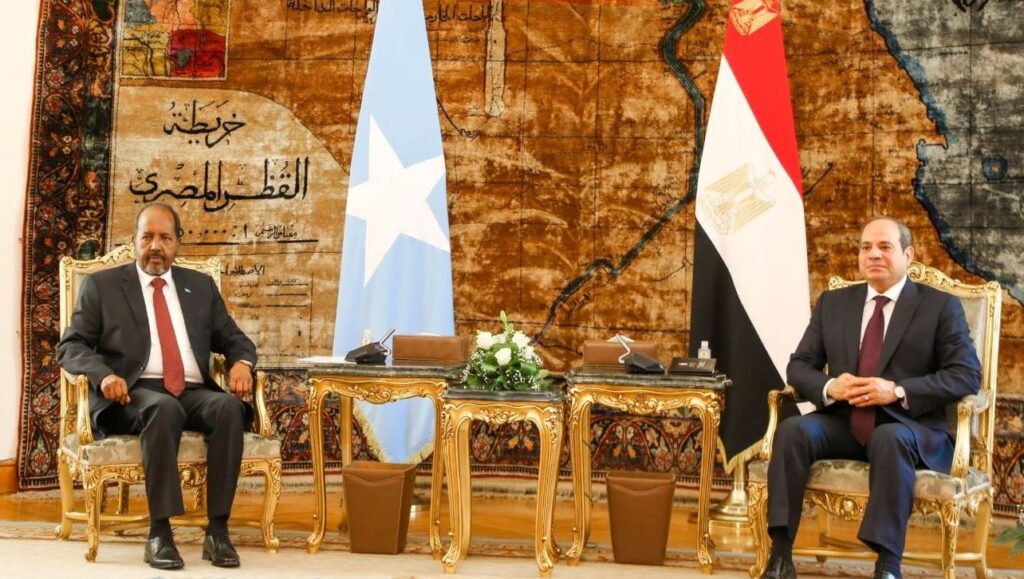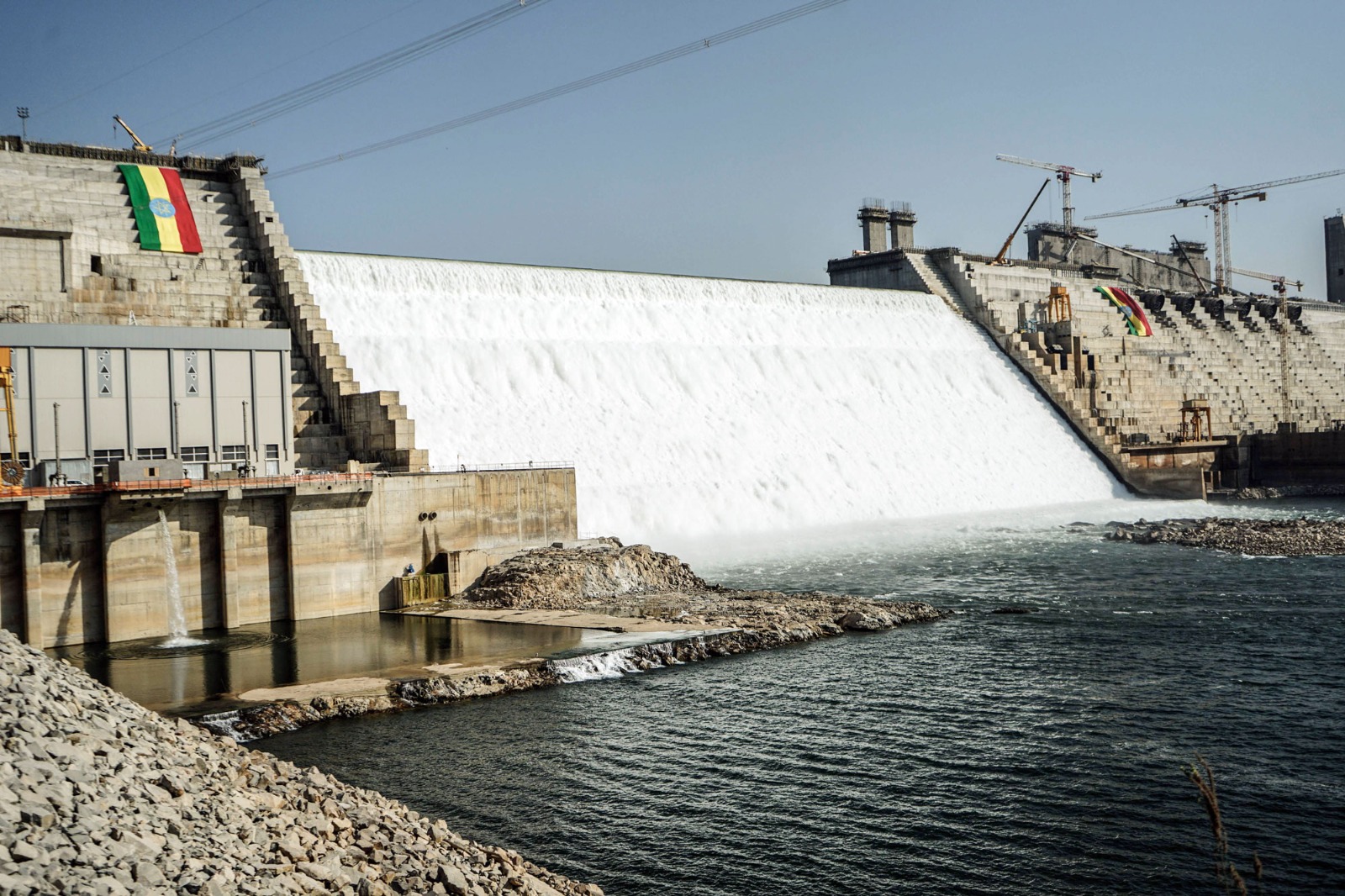Food & climate
A new episode in the series of disputes between Egypt and Ethiopia over the Renaissance Dam began after Cairo signed an agreement with Somalia. This angered Addis Ababa, which was reflected in the media and social media.
In August 14, Egypt and Somalia signed a defence pact to bolster security cooperation, Anadolu Agency reports.
The pact was signed after bilateral talks between Egyptian President, Abdel Fattah El-Sisi, and his Somali counterpart, Hassan Sheikh Mohamud, who was on a visit to Cairo.
Somalia said it is a “significant defence agreement between Somalia and Egypt, aimed at bolstering security cooperation between the two brotherly nations.”
At a news conference with El-Sisi, Mohamud said the “historic” pact is a testament to a future of common defence against international terrorism that Somalia is battling at home and abroad. One of the goals of the pact is to rehabilitate and train the Somali armed forces.
Ethiopia is the source of Nile
The Egyptian media welcomed strongly the pact while its Ethiopia counterpart described it as someone who sets himself on fire, according reports seen by “Food & Climate” platform.
For example, the website “Ethiopia News – Renaissance Dam” said on its account on the X platform: ” A Path to Self-Destruction: Egypt’s Strategy Could Backfire Catastrophically. Let’s be clear: Egypt can sign numerous military pacts, but it won’t change the reality that Ethiopia is the source of Nile. By continuing on this aggressive path, Egypt is engaging in a dangerous game that could cost it dearly, especially the vital water it depends on. Instead of seeking allies, Egypt is isolating itself, destroying relationships rather than fostering them”.
“This isn’t just a mistake; it’s a looming disaster. Making Ethiopia an adversary is akin to gambling with the nation’s lifeblood. While Egypt might withstand conflicts with Israel or the U.S., antagonizing Ethiopia risks every drop of water that sustains Egyptian life. The Nile will always originate from Ethiopia, and by turning Ethiopia into an enemy, Egypt jeopardizes its most crucial resource—maybe not today, but certainly tomorrow and for future generations”, it added.
While one follower said: “I can’t agree more. Thank you for no be speaking my mind. I don’t think they listen to any ones advice though until the fire they started elsewhere rekindled on their own faces and begins to consume them”.
“Ethiopia News – Renaissance Dam” commented: “Exactly, it’s surprising that they can’t see the danger they’re creating. Hopefully, they realize before it’s too late and the consequences hit hard”.
In January, Somalia and Ethiopia tensions has heightened because of a controversial deal in which Somaliland would lease a portion of its coastline to Ethiopia for the establishment of a marine force base, in exchange for Ethiopia potentially recognising Somaliland’s independence.
And Ethiopia announced that included lease of the Berbera port, located a few steps from the Red Sea, for fifty years, which would allow Ethiopia, a landlocked country that does not overlook seas or oceans, to reach the Red Sea and threaten Egyptian interests.
Somalia, which considers Somaliland part of its territory, has strongly opposed the agreement and has even suggested that it is prepared to take drastic measures to defend its claims.

Fifth filling
Ethiopia began the fifth filling of the Renaissance Dam on Wednesday, July 17, 2024, despite repeated warnings from Egypt. At the time, Egyptian geologist Abbas Sharaky posted a satellite image of the fifth filling on his Facebook account. Sharaki wrote on his account on Saturday, August 17, 2024: “Ethiopia stored 12 billion cubic meters in the Renaissance Dam within a month, as the fifth filling began on July 17, 2024. Last year’s storage volume reached 41 billion cubic meters, which means that the total amount of water reached 53 billion cubic meters; at a level of 634 meters.”
He added that the filling is expected to continue until the beginning of the second week of next September, reaching 64 billion cubic meters; at a level of 640 meters.
In December 2023, Egypt announced the end of the fourth and final meeting of the Renaissance Dam negotiations between Egypt, Sudan and Ethiopia, which was held in Addis Ababa, “without achieving any results”.
The Ministry of Irrigation said in a statement: “The continuation of Ethiopian positions over the past years rejecting any of the technical and legal middle solutions that would secure the interests of the three countries, is the reason for the failure of the negotiations.”
It added that in light of these Ethiopian positions, the negotiating tracks have ended, and stressed that Egypt will closely monitor the process of filling and operating the Renaissance Dam, and that Egypt reserves its right guaranteed by international conventions to defend its water and national security.
The ministry added, “It has become clear that the Ethiopian side intends to continue exploiting the negotiating cover to establish a fait accompli on the ground, and to negotiate for the purpose of extracting a document of approval from the two downstream countries for the absolute Ethiopian control over the Blue Nile, in isolation from international law”.

